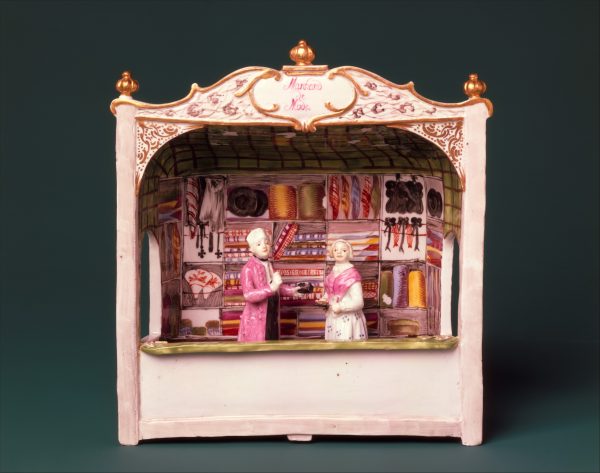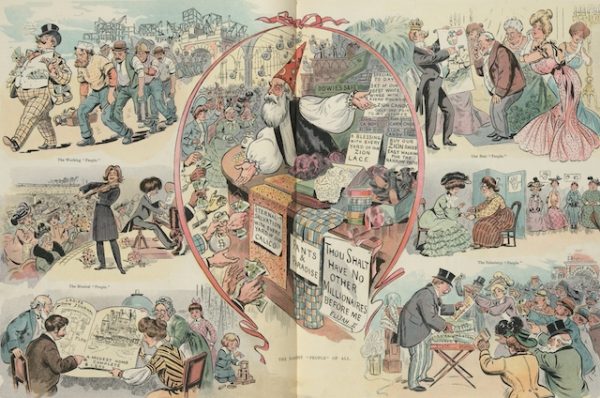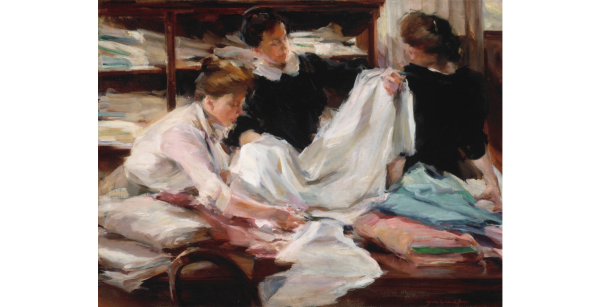Taking Shopping Seriously

This post went out to subscribers to my Substack newsletter on February 3, 2023. Check out all the posts, including ones from the archives not reposted here, and subscribe here.
This is a speech I gave at the Atlas Network’s annual conference in 2012. They asked me to give an after-dinner keynote and I agreed, on the condition that I could talk about whatever I wanted to. The Atlas Network is an international organization of free-market policy-oriented think tanks. So the topic was, as the talk acknowledges, a departure. I’ve resurrected it because the popularity of my WSJ article on shopping and equality has me thinking about possible books and, given funding, perhaps even a [Your Name Here] Center for the Study of Commerce and Culture to take up these and other questions.
Now that you’ve had a good conference learning about taxation, regulation, and monetary policy, I want to talk about something really important.
Shopping.
Specifically, two big questions:
Why do people buy things?
Not why do they buy things instead of producing them personally, but why do they buy the specific things they buy. And particularly...
Why do people buy things they “don’t need”?
Americans, at least, buy so many things that The Container Store does a good business selling us things to put them in.
Why do people buy things they “don’t need”?
Through most of human history, that wasn’t a question that came up very often, at least not when you were talking about the general public. It still puzzles people who think about it. It’s a hard question.
But scholars get paid to think about hard questions, and they’ve come up with some explanations.
It’s a fetish.
This is from Marx and Freud and their various offspring. Take your pick. The word “fetish” takes on slightly different meanings depending on the theorist. But it’s definitely derogatory. Primitive, superstitious, and perverted.
The basic point is that the consumer is tricked by an outward appearance and manipulative marketing into ignoring the real “use value” of the product that comes from the legitimate values of material and labor that go into producing it.
Anything subjective—anything about you rather than the way the thing was produced — is an illusion.
Consumers buy things they don’t need because they are hypnotized.
People buy things they don’t need because they’re dupes.
This is the theory that most cultural-studies scholars start with. It’s what they teach their students. This sort of theory is even what students enrolled in the Branding master’s program at the School of Visual Arts (where I teach a short seminar) are assigned, not because the program is some kind of Marxian indoctrination program—to the contrary, it’s professional training for people who’ll work in ad agencies and marketing departments—but because those are the books available to tell the story of consumer culture.

You’ll be happy to know that Marx and Freud don’t have a monopoly on explanations. Social scientists, including some economists, offer an alternative to pure trickery and delusion.
It’s status competition.
“Conspicuous consumption” is what Thorstein Veblen called it. We buy things we don’t need because we want to keep up with the Joneses. We aren’t foolish. We’re envious and insecure.
This explanation has three virtues:
1) It offers an intangible source of value that doesn’t require that we attribute supernatural powers of manipulation to capitalist producers.
2) It fits neatly into various mathematical models.
3) And it’s sometimes even true.
Free-market supporters and most economists have two answers of their own to the question of why people buy things they “don’t need.”
We don’t know.
We don’t care.
There’s no accounting for tastes and no clear distinction between “need” and “want.” People decide for themselves what they like, and they make the best choices they can, given their incomes, among the goods and services available to them. It doesn’t matter where these choices come from. All that matters is that people are free to make them—and, of course, what goods are available and what their incomes are.
So let’s fight about entrepreneurship, free trade, and redistribution and forget all this silly stuff about shopping. If we admit the question of why people buy things—and particularly why they buy things they “don’t need”—might be important, it will only encourage laws to restrict what people can buy.
That may sound logical, but it’s a dangerous and foolish attitude.
Now, I agree with the concepts of consumer sovereignty and subjective value. And I’m all in favor of specialization. You don’t have to be interested in why people buy what they buy. You can be a political philosopher and argue about the legitimacy of the welfare state. You can be an economist and argue about tax incidence or the importance of international trade in development. You can be Ayn Rand and celebrate the heroic entrepreneur.
But we don’t apply the same don’t know/don’t care standard to the supply side of the market. We do care about what motivates entrepreneurs. We do care where innovation comes from. We do care what production and work mean in people’s lives. When we talk about production, we do think culture and psychology are interesting for their own sakes as well as how they bear on public policy.
The same should be true of consumption.
Do we really want to leave thinking about demand—the half of the market that accounts for most of our everyday economic experience, and certainly for most of the variety of our everyday economic experience—to the Marxists, the Freudians, and the status-obsessed? To people who have contempt for markets and for what Deirdre McCloskey in her important recent book calls “bourgeois dignity”?
Just because thinking about why people buy what they buy means thinking about culture and psychology rather than the role of the state doesn’t mean it’s irrelevant to freedom.
The good news is that there is a significant group of scholars who do understand that shopping has something to do with freedom.
They are feminists. Not all feminist scholars take this view, of course. Plenty subscribe to Marxian or Freudian or status explanations. But nearly all the scholars who write about consumer culture in a way that appreciates its relation to freedom are feminists.
What they teach us is that the growth of what is sometimes called the “consumer society” was good for women.

Poor girls could become shop clerks instead of servants. They could go shopping themselves and forge careers as buyers and even store detectives.
Middle-class ladies could get out of the house into a new and respectable public sphere. They could meet friends for conversation in department-store tea rooms.
Magazines supported by ads for cosmetics and fashion could argue in favor of women’s rights and give readers new images of female achievement.
Businesses that wanted to sell things to women had to pay attention to what they wanted. That meant goods and services, but it also meant the environments, institutions, and behaviors that surrounded those things.
The consumer society made women public and independent in new and powerful ways—not through politics, at least not at first, but through the marketplace.
Feminist scholars study these subjects, in the past and in the present. And, believe it or not, they don’t start with the assumption that people—that women—buy because they’re hypnotized. They respect consumers, because they respect women. And that’s a good start.
But the serious study of consumer culture should not be left to the feminists, as valuable as their work may be. For one thing, they aren’t too interested in the other half of the population. Men do buy things, and their experiences are important too. Plus, a lot of these feminist scholars tend in a socialist direction.
We need other voices, asking other questions.
Let me make it clear that I am not arguing for libertarian fables. The last thing the public discussion of culture and consumption needs is more ideological nonsense.
Human behavior, including market behavior, is complex, and it includes wrongdoing and mistakes. If you look honestly at why people buy what they buy, you’ll find some things you won’t like. And you’ll find some things that are just strange.
If we are correct, however, that freedom is good and that free markets are part of that good, taking shopping seriously will only enhance our understanding of why that is so.
There are three reasons people who support free markets should care about consumption in particular and the intersection of commerce and culture more generally—why it’s not enough to pay attention only to politics and policy.
The first is political.
By discrediting nearly every purchase decision, the fetish/status explanations undercut the legitimacy of nearly all market transactions and, thus, the legitimacy of markets as a whole.
On a practical policy note, if you can’t explain why people’s decisions about buying shoes make sense, you’ll never be able to explain why they should be allowed to decide about really complicated goods like health care or education.
You’ll never be able to explain why this or that “unnecessary” purchase shouldn’t be banned, regulated, or taxed—or why taxing away people’s unnecessary income is a bad idea.
Thinking about why people buy what they buy means thinking about the origins and nature of economic value, which is critical to thinking about and defending markets. It’s great to celebrate and defend entrepreneurship and production, but neither works without customers. And we are all customers.
That brings us to the second reason, which is practical.
If you’re a business person, you need to understand why people buy whatever it is you’re selling. What value are you creating? Is it simply utilitarian? Or is there more to it than that? And, if so, what?
The final reason, the one I really care about, is intellectual.
Understanding how the world actually works, what the past was really like, how human beings actually think and act is valuable in and of itself.
Knowledge is good.
That may have been a joke slogan in Animal House but it’s the truth.
And knowledge has practical consequences: What we know determines how we understand ourselves and our society. And how we understand ourselves and our society determines what actions we take, individually and collectively.
So I hope that while you’re thinking about how to promote freedom and improve policy, you will devote at least a little attention to the questions of why people buy what they buy and how markets evolve to serve not just practical but intangible needs and wants. Document what you see in your country and share it with the world—and with the future.

I would like to end with a story from Linda Scott, a [now-emerita] marketing professor at Oxford’s Said School and one of those feminist scholars I mentioned earlier—but not a socialist. She wrote an excellent book called Fresh Lipstick about feminism and consumer culture in 19th and 20th-century America, and now she works on projects in developing countries.1
One of the projects she has studied is the CARE Bangladesh Rural Sales Programme, which helps women, mostly widows, sell a wide range of products—food, seeds, toiletries, medicine—door-to-door to other women in rural Bangladesh. The program provides distribution both for products from multinational companies like Unilever and for locally produced goods.
These female peddlers bring the chance to shop to rural women who, following local custom, never leave their homes. The successful ones, like Asma and Jasmeen, understand what their customers want beyond mere survival. Asma, for instance, sells “everything they need to take care of their bodies.” And she sells beautiful saris, blouses, and petticoats.
One of the most remarkable things about the program is that it has changed the colors of saris women wear. Before, men bought for their wives and mothers, and most saris were blues and greens. Now women buy for themselves, and they choose reds and pinks. “Imagine,” writes Scott, “the articulation of control that comes from having to wear someone else’s choice of clothes–and the small but very important liberation that comes from choosing your own.”
Anyone who has ever been on one side of a parent-child struggle over clothing knows what she’s talking about. The chance to choose our own clothes is one of the first freedoms we crave as children. It is one of the freedoms we hold dearest and take for granted most often. The freedom to choose our own clothes isn’t made possible merely by the absence of a legally mandated dress code. An economic revolution first had to happen to allow us to buy clothes we “don’t need.” To understand the liberating power of markets, we have to understand culture as well as politics, and consumption as well as production. We have to take shopping seriously.
1 The information in the book is fantastic. The tone is angrier than would be most persuasive, reflecting the author’s infuriation at the narrow historical narrative and patronizing attitudes of some of her fellow feminists.